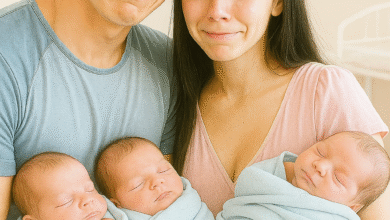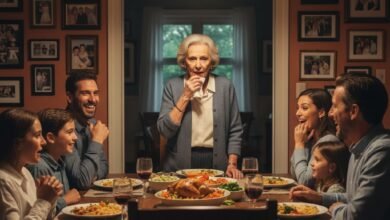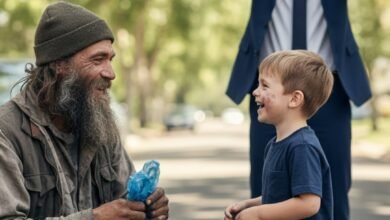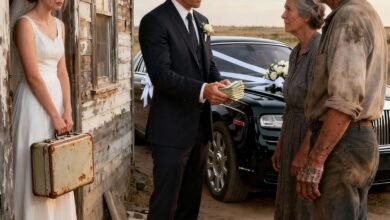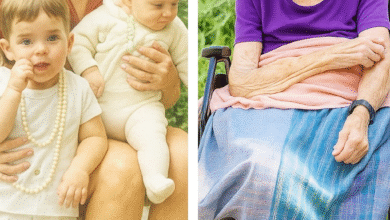HE SAW SOMEONE WHO LOOKED LIKE HIM — AND SUDDENLY, HE WASN’T SHY ANYMORE.
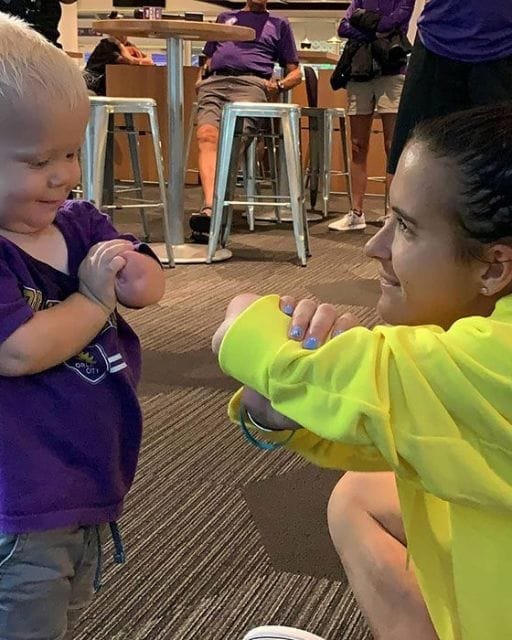
It all started with him hiding behind my leg.
Luca has never been one to talk to strangers. He pulls at the hem of his shirt, curls into himself, and gets nervous in crowds. When you’re born without part of your arm, people stare. Some whisper. Some ask questions that make me wince—so imagine how it feels for a little kid.
We were just grabbing snacks at the stadium when she noticed us.
She was wearing a yellow sweatshirt, kneeling in the corner of the lounge, chatting with a few fans. But when she looked up and saw Luca, her expression completely changed.
She stood up, walked over slowly, and knelt down again—right at his level.

Then, without saying a word, she raised her arm.
It looked just like his.
Luca froze. His eyes widened. Then he looked up at me as if to say, is this real?, and slowly, as if it were the most sacred thing in the world, he raised his arm to meet hers.
Their elbows touched.
And then he smiled. A real smile. That soft, proud grin that only shows up when he feels brave, seen… and not so different after all.
As it turns out, she was a professional athlete. Born just like him. She told him,
“You can do anything you want. Even better than most.”
I don’t think he understood every word she said.
But the way he stood a little taller after that? The way he walked through the stadium with his arm lifted and his chest out?
Yeah. He got the message.
And what she told me before we left… I’ll never forget it.
She brushed her short hair behind her ear, looked from Luca to me and said,
“You know, kids like him—they need moments like this. The world works really hard to make them feel less. Not because they are, but because they’re different.”
Her voice was calm, almost matter-of-fact. But every word carried weight. She wasn’t just talking—she was sharing a part of herself, hard-earned wisdom from living in a body that didn’t fit the mold.
She pointed to Luca, who was now happily inspecting one of those oversized foam fingers.
“He doesn’t see himself as less anymore. Because now, he’s seen someone like him winning. We underestimate the power of representation.”
I nodded, gripping my coffee cup tighter than I meant to. Her words hit me harder than I expected. They weren’t just about Luca. Somehow, they unlocked my own childhood fears and insecurities.
She continued,
“Let him dream big. Don’t let anyone—not even you—tell him he can’t.”
Then she gave us both a warm smile, tousled Luca’s hair, and walked back to her group. I stood there with tears stinging the corners of my eyes as she disappeared into the crowd.
The ride home was unusually quiet. Luca stared out the window, still holding the foam finger like a trophy. And for once, I didn’t try to fill the silence. I let him have his moment. Whatever magic had happened back there, he needed time to hold onto it.
But life has a funny way of testing the lessons it just taught you.
A few weeks later, Luca came home from preschool looking downcast. That day, the class project had been to trace their hands on construction paper. Simple enough—unless you’re a child with a limb difference. When Luca hesitated, a classmate (I think his name was Ethan) blurted out,
“Why does your hand look weird?”
My heart sank. I wanted to storm into that classroom, demand answers, insist on apologies. But instead, I sat Luca down and gently asked how he felt about it.
He picked at the corner of the table and mumbled,
“I don’t know. Everyone looked at me.”
He didn’t bring it up again for days. And no amount of reassurance seemed to help. I kept thinking about that woman in the yellow sweatshirt. What would she have done?
That’s when it came to me.
I called our local community center—where Luca sometimes took swim lessons—and asked if they had any programs for children with disabilities. To my surprise, they did: a monthly meet-up for kids with limb differences and their families. I signed us up immediately.
The first meeting was nerve-wracking for both of us. Luca clung to my hand as we walked in, scanning the room cautiously. But within minutes, he saw a boy his age building a LEGO structure using only his feet. A girl nearby was painting with a brush held between her teeth. Fear gave way to curiosity, and Luca wandered off to join them.
By the end of the afternoon, he was playing and laughing like I hadn’t seen in weeks. Watching him interact with those kids—each with their own challenges, each radiating confidence—brought me right back to that moment at the stadium. These weren’t just playdates. They were lifelines.
During snack time, a woman named Clara introduced herself. Her son, Mateo, was the one building with LEGOs. She shared stories that echoed so many of my own fears—how hard it was to get Mateo included in “mainstream” spaces. We exchanged numbers and agreed to keep in touch.
Over the next few months, Luca blossomed. He learned new skills, made friends, and began to take pride in who he was instead of dwelling on what he wasn’t. But deep down, I still felt like something was missing. Something bigger.
Then one night, I came across a video of that same woman from the stadium. She was giving a TED Talk on identity, embracing difference, and perseverance. Her name was Marisol Rivera—Paralympic gold medalist.
I messaged her right away. I thanked her for the impact she’d had on our lives and briefly shared how much that brief meeting had changed us. To my shock, she replied within hours.
Marisol offered to host a virtual Q&A for our support group. She said she’d love to tell her story, answer questions, and encourage the kids. I was excited—and terrified. Would Luca engage? Would the other kids connect with her?
The day of the call, nerves were high. But the moment Marisol appeared on the screen with that same warm smile, all the tension melted. The kids took turns asking questions:
“What sport do you like most?”
“Have you ever felt sad about your arm?”
“How fast can you run?”
Then it was Luca’s turn. He didn’t ask about medals or achievements. Instead, he asked softly:
“Do you ever get scared?”
Marisol paused thoughtfully.
“All the time,” she said. “The thing is, being afraid doesn’t mean you stop. It just means you keep going anyway. Bravery isn’t the absence of fear—it’s doing what matters with the fear.”
Luca nodded slowly, taking it all in. And I sat there with tears in my eyes.
Now, a year later, Luca is no longer the shy boy who hid behind my leg. He started kindergarten with confidence, joined an adapted junior sports team, and even read a poem about being “different but awesome” at a school assembly.
And I learned something too:
Representation isn’t just about seeing someone who looks like you. It’s about knowing you belong. Believing you’re enough. Trusting that who you are is more than okay—it’s powerful.
And the best part? Marisol invited Luca to attend a tournament she’s competing in.
Guess who’s got VIP seats right up front?
Yep. Us.
Life has a beautiful way of coming full circle.
Message: Sometimes, it takes just one person to show us we’re not alone. Connection changes everything—whether it’s with a friend, a role model, or a stranger in a yellow sweatshirt.
If this story moved you, please share it. Let’s remind the world that everyone deserves to feel empowered, valued, and seen. ❤️
